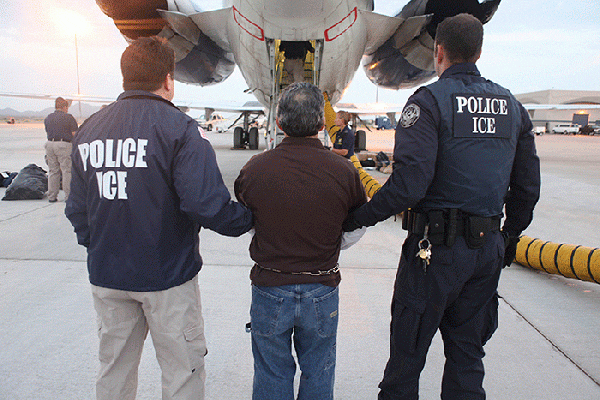
DEARBORN — Many Arab immigrants say they still face unjust deportation and restrictive citizenship opportunities, even after President Obama’s executive action on immigration.
The U.S. Citizenship and Immigration Services makes it clear that aliens— those who are non-native and non-naturalized citizens— are subject to deportation or “removal” from the U.S. if they violate any immigration laws. So, if a foreign-born U.S. resident who’s here based on a work visa commits a crime, the U.S. Immigration and Customs Enforcement (ICE) has the right to take that person into custody and deport him or her.
Obama’s immigration reform action, announced in Nov. 2014, would expand deportation relief to almost half of undocumented or improperly documented immigrants.
A July Pew Research study reported there were 11.3 million unauthorized U.S. immigrants in 2014, making them 3.5 percent of the nation’s population.
Who gets deported and why?
Many of those being deported, however, are not criminals and find it hard to find relief from removal, said Reem Khraizat, an immigration attorney practicing out of Dearborn.
Khraizat said immigration laws have become more restrictive, even though immigrants have families at stake.
She explained that many foreigners leave their countries of origin because their governments aren’t supporting them financially, they can’t pay tuition or they can’t find affordable housing.
When an immigrant arrives in the U.S. on a school visa, for example, some find out they can attend school but not work. When ICE discovers that they are working and going to school at the same time, they are placed into removal proceedings. They can then be charged, arrested and deported.
The attorney added that if, for example, a university student cannot afford tuition and stops paying, that student will “fall out of status.” If the student is stopped for a traffic violation, the officer can refer the matter to ICE, which will open a case to remove the individual from the U.S.
An Arab American businessman, who wished to remain anonymous, told The Arab American News that when he immigrated to the U.S. 30 years ago, he attended a university in Texas. He said he failed to complete a course at the university, which he thought he didn’t need to take at the time. After applying to a Michigan university, that school noticed he hadn’t completed the credits he was required to take on a student visa. As a result, he was deported. He was subsequently able to return to the U.S. and is now a citizen.
“The system is completely failing”
Khraizat said many immigrants become compromised because they have fallen through the cracks of the legal system.
Arabs— unlike many other illegal immigrants who cross borders— have to fly in to the U.S., so they almost never come here illegally, Khraizat said.
“The system is completely failing,” she said. “They know these people are here and they’re not leaving.”
She added that being illegal affects immigrants’ ability to obtain a driver’s license and go to work. Many times, they end up paying hundreds of dollars worth of tickets because of driving without a license.
Khraizat said officers know ICE will not pursue these individuals because they don’t have criminal records, so their cases are dismissed by an immigration judge. However, these individuals are still not issued the proper documents to live in the U.S.
“We know you’re here illegally, but go back out there and good luck to you,” Khraizat said, mocking the system.
The struggle for naturalization
She added that immigrants want to be able to obtain driver’s licenses and social security numbers so they can file taxes.
“They tend to be very good laborers,” she said. “We get calls from sponsors all the time.”
About 5 percent of unauthorized immigrants make up the U.S. labor force, reports the July Pew Research study.
Samantha Magdaleno, a community organizer at One Michigan for Immigrant’s Rights, said she recently worked on a case involving an Albanian Muslim man who immigrated to the U.S. 30 years ago, but was recently deported.
Magdaleno said Kujtim Jusufi, who immigrated to the U.S. at age 17 without his parents, was arrested at 19 because his friend carried an unlicensed gun in his car. He was never imprisoned; he completed community service and paid his fines. The Albanian immigrant eventually married an American woman for seven years.
Then ICE pursued him, stating his marriage was fraudulent.
Magdaleno said that under the president’s new executive action, Jusufi was labeled as a high priority case— based on a felony from 27 years ago.
One Michigan, which fought for his rights to stay in the U.S., collected letters from business owners, six city council representatives and school officials and held rallies to extend his deportation date. The Detroit ICE decided to use prosecutorial discretion, allowing it to decide what charges to bring and how to pursue each case. In this case, it decided to deport Jusufi to Macedonia.
Jusufi’s current wife, 9-year-old son and 6-year-old daughter are depressed, said Magdaleno. She added that his kids always ask for their father and his wife was so depressed for the first five days after his deportation that she refused to change her clothes.
His daughter often says “tell Obama to bring daddy back,” Magdaleno said.
One Michigan now supports the family by helping them pay bills, driving them to grocery stores and taking them to get haircuts.
What can be done?
Magdaleno said the use of “illegal immigrant” in national media puts a
negative stigma on immigrants.
“Immigration status is now the new way to cover up for racism,” she said.
She added that raising awareness, advocating for municipal ID’s (if you have a child in school, you cannot visit them without an ID) and getting immigrants more integrated in their communities are important steps to take to help them function in society.
“If you have papers, go to get a municipal ID to show solidarity and get the momentum going,” she asked of immigrants.






Leave a Reply